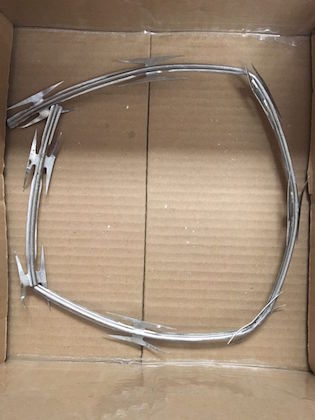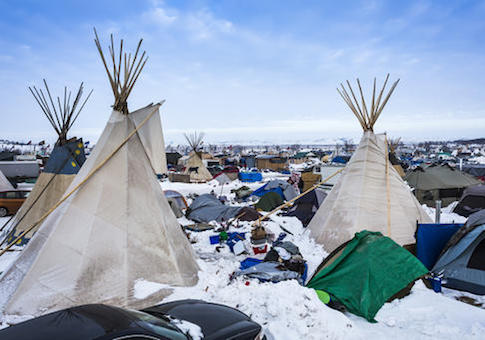Lawyers defending law enforcement officers who were policing protests of the Dakota Access Pipeline in North Dakota compiled nearly 40 pages of violent threats toward officers and their families.
The officers are defending themselves from a lawsuit filed by a group of "water protectors" who say they were subjected to unlawful force during a night of protest in November 2016.
The officers deny that measures they took to control the protests were excessive. They also say they were pushed to use crowd control tools such as water hoses and non-lethal munitions because protestors had threatened violence against them on social media.
"Maybe it is time to show up to the protest armed," says one post included in the document. "Put some fear into police officers and force them to behave themselves."
The threats stated that "cops need to get throats cut," "cops need to die," and "the only good cop is a dead cop." Messages sent directly to officers said that they should "damn well know [they are] getting a bullet in the head" if they show up at the protest site. Many of the posts were accompanied by pictures of firearms and other weapons.
Morton County Sheriff Kyle Kirchmeier, the chief defendant in the case, told the Washington Free Beacon that the state's intelligence center would investigate the threats and notify him if the senders were in the area. Many of them were, which led Kirchmeier to consider them real threats to his officers.
"A lot of the ones that made the threats were known to be in the area," Kirchmeier said. "If we could identify them then they were put on a watch list."
Compounding the threats was the use of "doxxing," the internet practice of releasing personal information about individuals and their families. The document shows that officers' personal information was often released with the threats.
Threats to Law Enforcement exhibit by Washington Free Beacon on Scribd
Kirchmeier, whose home address, phone number, and pictures of himself and his wife were shared widely on the internet, said his son also received threatening calls.
Police officers working the protest site and correctional officers working at the facility where arrested protestors were held were often followed around while they were off duty. Patrols had to be increased in areas where officers lived.
Kirchmeier said that the documented threats put officers in a state of mind where they had to question the intentions of everybody around them and take "necessary precautions."
"It puts the officers working the protest activities in an unsafe situation because of the unknown, which is why we take the necessary precautions to make sure that law enforcement is protected as possible," Kirchmeier said. "That means wearing the proper gear and having the tools necessary to combat the threats."
The threats were accompanied by actual instances of violence, Kirchmeier said.
"With the threats towards law enforcement and us seeing items thrown at law enforcement such as burning logs, feces, hatchets, knives, spears, fence posts, and Molotov cocktails—it makes the officers go into a mode where they don't know whether they can trust people," the sheriff said.

The sheriff's office pointed to video that it says captures protestors stealing barbed wire from fences to make "razor Frisbees" that could be thrown at officers. Officers also say they had lasers pointed at them during night protests, leading to fears they were being targeted by snipers.
Rachel Lederman, the San Francisco lawyer representing the protestors, told the Free Beacon that the idea that police felt threatened by social media threats is "ludicrous" and that none of the threats came from plaintiffs named in the lawsuit.
Lederman said that she has seen "zero evidence" suggesting that any threats came from individuals participating in the protest and indicated that many could have been false flags.
"I wouldn't be surprised at all to find out that actually some of these supposed social media posts were made by Dakota Access employees," Lederman said.
Lederman's lawsuit sought monetary damages and an injunction that would bar law enforcement from using certain tools to disperse unruly crowds.
A federal judge rejected the injunction request earlier this month, stating that "no reasonable juror could conclude" that officers acted unreasonably, especially since the protestors in question were trespassing.
"The rights of free speech and assembly do not mean, and have never meant, that everyone who chooses to protest against the Dakota Access pipeline may do so at any time, any place, and under any set of conditions they choose in total disregard of the law," said the judge. "To allow that to occur would result in anarchy and an end to the rule of law in civilized society."
Lederman, who told the Free Beacon that her clients were unaware they were trespassing, is appealing the judge's preliminary ruling on the injunction. She says she is confident the protestors will prevail.
Protestors were removed from the protest site in Morton County last week.
Critics have slammed the now-departed protestors for leaving behind giant piles of trash that will need to be cleaned up before flood season to avoid contaminating local water sources.
"One of the main arguments against constructing the Dakota Access Pipeline in the first place was that it was an environmental risk, since a rupture in the line could contaminate potable water in the area," wrote Reason's Lindsay Marchello. "Now it seems the protesters themselves may end up polluting the rivers, if their debris can't be cleared out in time."
Clean-up crews found numerous puppies that had been abandoned at the site. The animals have since been taken in by a local animal rescue group.
Kirchmeier said that his top priority is to keep everybody safe.
"I'm concentrating on making sure that public safety stayed number one during this ordeal, not only for law enforcement and citizens but also for the protestors," he said. "If they were doing the protests legally, we have absolutely no issue with that—but that hasn't been the case."
